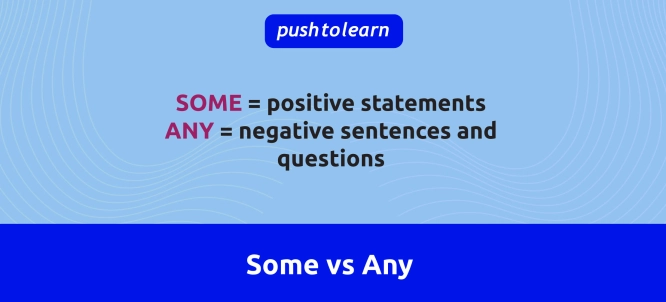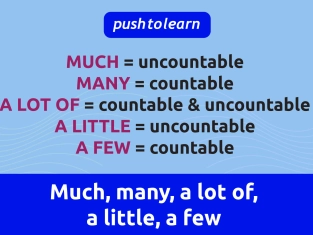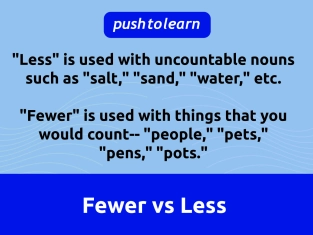by PushtoLearn
Some vs Any - Countable and Uncountable
Table of Contents
Some vs Any - Exercise and Quiz
These exercises focus on Some vs Any
What is the Difference Between Some and Any?
|
Word |
Used in |
Example |
|
Some |
✅ Affirmative (positive) sentences |
I have some apples. |
|
Any |
❌ Negative sentences |
I don’t have any sugar. |
|
Any |
❓ Questions |
Do you have any milk? |
-
Some is used when we talk about a small, indefinite amount in positive sentences.
-
Any is used in negative sentences and questions.

Some vs. Any with Countable and Uncountable Nouns
1. Some – Used in Positive Sentences
We use some when we are talking about an unspecified quantity in a positive sentence.
|
Type of Noun |
Example |
|
Countable (plural) |
She bought some apples. |
|
Uncountable |
There is some water in the bottle. |
2. Any – Used in Negative Sentences
We use any when there is nothing or not enough of something in a negative sentence.
|
Type of Noun |
Example |
|
Countable (plural) |
He doesn’t have any oranges. |
|
Uncountable |
There isn’t any sugar in the tea. |
3. Any – Used in Questions
We use any when we are asking about the existence of something.
|
Type of Noun |
Example |
|
Countable (plural) |
Do you have any books? |
|
Uncountable |
Is there any milk in the fridge? |
Special Uses of Some and Any
1. Offering and Requesting – Use “Some” in Questions
Normally, we use any in questions, but when we offer or request something, we use some.
|
Situation |
Example |
|
Offering |
Would you like some tea? |
|
Requesting |
Can I have some sugar, please? |
2. “Any” for “It Doesn’t Matter Which”
We use any to mean "it doesn't matter which one."
|
Situation |
Example |
|
Choosing |
You can take any book you like. |
|
Possibility |
Call me anytime. |
Common Mistakes
1. Using "some" in negative sentences
❌ I don’t have some money.
✅ I don’t have any money.
2. Using "any" in positive sentences
❌ She has any friends.
✅ She has some friends.
3. Forgetting that uncountable nouns don’t take plural
❌ I don’t have any waters.
✅ I don’t have any water.
Everyday Use of Some vs. Any
-
At a restaurant: Do you have any vegetarian dishes?
-
Shopping: I need some tomatoes for the salad.
-
At home: There isn’t any bread left.
-
At work: Can I have some help with this task?
See also: Irregular Plural Nouns
FAQs about Some vs. Any
Can I use "some" in questions?
Yes, when making offers or requests. (Would you like some coffee?)
Can I use "any" in positive sentences?
Yes, when it means "it doesn't matter which". (You can choose any color.)
Do "some" and "any" work with singular countable nouns?
No, we only use them with plural countable or uncountable nouns.
What is the difference between “some milk” and “any milk”?
-
I have some milk. (Positive statement – There is milk.)
-
I don’t have any milk. (Negative statement – No milk.)
-
Do you have any milk? (Question – Asking if milk exists.)
Can "some" mean "a few"?
Yes! Some people like coffee, some don’t. (Here, some means a few but not all.)

